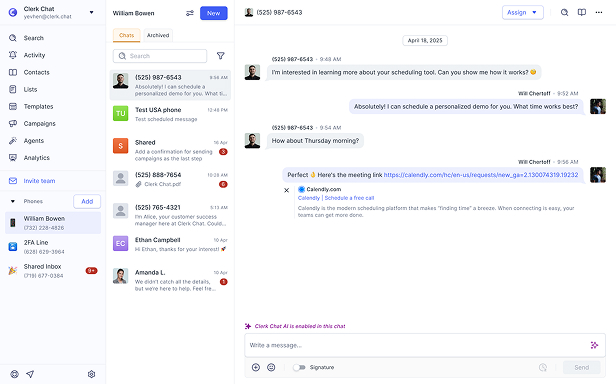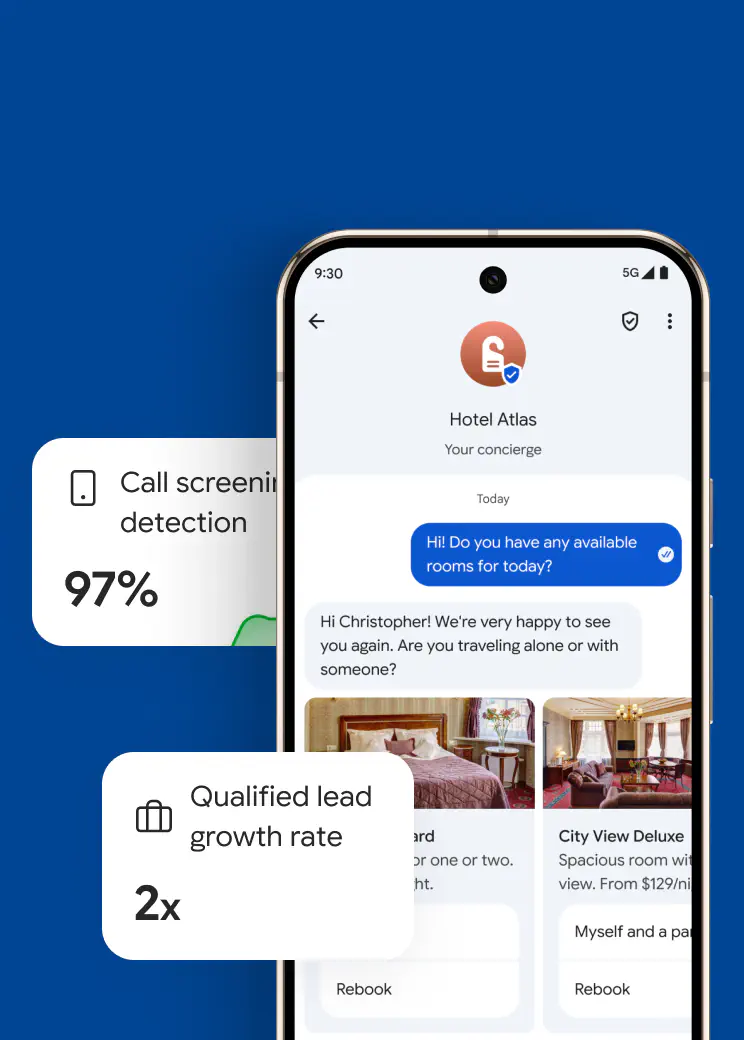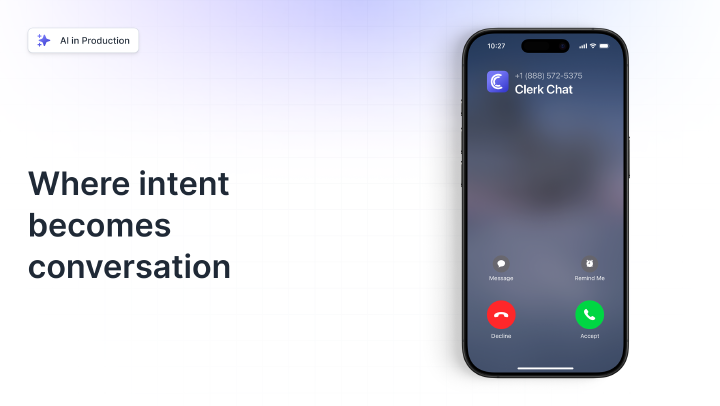SMS Marketing: The Ultimate Guide for Businesses
By Team Clerk Chat
- Published: September 16, 2024
SMS marketing is quickly emerging as one of the most valuable, cost-effective, and powerful ways for businesses to engage, nurture, and convert customers. Over 7.2 billion people worldwide already own a smartphone, making mobile the perfect way to connect with a huge audience.
What’s more, over 66% of consumers worldwide say they use text messaging regularly to connect with companies. Text message marketing gives companies an incredible opportunity to reach prospects wherever they are, spread brand awareness, and increase revenue.
However, the wrong strategy can also lead to frustration among consumers, as well as legal repercussions and fines. Here, we’ll show you how you can invest in the benefits of personalized text messaging for your marketing strategies, while minimizing your exposure to risks.
What is SMS Marketing? An Introduction
SMS marketing, or text message marketing, is a form of mobile marketing that involves using an enterprise SMS service to send text messages to send text messages to customers and prospects. It’s a strategy companies can use to enhance customer service, improve brand awareness, increase engagement, and even optimize conversion rates.
Combined to other marketing methods, SMS offers a host of valuable benefits, from high average open rates, to increased visibility. With SMS, you don’t have to wait until a customer checks their email inbox or visits your website to connect with them.
Instead, you have direct access to billions of potential customers worldwide, all waiting to hear about your latest products and services.
The Benefits of SMS Marketing for Business Growth
SMS marketing offers companies a cost-effective and powerful way to engage audiences. In fact, these days, customers actually want to receive messages from their favorite brands. More than 91% of customers has said they’re interested in receiving promotional texts from companies.
Compared to other marketing strategies, SMS advertising delivers:
- Higher open rates: With email and social media, you often have to wait longer for customers to actually see messages from your company. Alternatively, SMS marketing benefits from extremely high deliverability and open rates. Studies suggest that up to 98% of SMS marketing messages are opened – often within minutes of delivery.
- Direct communication: SMS marketing is a lightning fast way of connecting with customers. Every message is delivered to your customers immediately. This means you can use your short code texting service to instantly share time-sensitive messages about flash sales, upcoming events, and exclusive promotions.
- Cost savings: SMS marketers generate around $71 in return revenue for every $1 they spend according to some studies. SMS is one of the cheapest forms of outreach, making it easy and affordable for companies to engage with huge numbers of customers at once. Using mass texting services, you can communicate with hundreds of thousands of customers.
- Personalization and targeting: Using the right marketing automation software, companies can segment leads into different groups based on their demographic, behavioral, and purchasing data. This makes it easier to create highly personalized campaigns that significantly boost your chances of conversions, and increase customer loyalty.
- High conversion rates: SMS marketing campaigns are proven to drive conversions. Not only are customers 134% more likely to respond to an SMS than an email, but SMS messages are excellent at driving customers to physical and online stores. They can even help to re-engage lost customers and reduce abandoned cart rates.
Additionally, SMS marketing campaigns are excellent for complementing other marketing strategies. You can use your SMS lead generation and advertising strategies alongside social media campaigns, email, and other forms of direct outreach, giving you multiple ways to connect with customers.
The Common Types of SMS Marketing Messages
There are many different types of SMS marketing messages companies can use to build and strengthen relationships with customers. Some of the most common types include:
1. Promotional SMS Messages
Promotional SMS messages are the messages you use to generate interest for a product or service. They can include everything from personalized notifications that introduce customers to new products or solutions, to messages that encourage conversions with discount codes, coupons, and offers.
Companies create all kinds of campaigns using promotional SMS messages, from welcome campaigns that introduce leads to a product or service, and showcase top products, to flash sale campaigns, and abandoned cart recovery campaigns.
Companies can even use promotional messages to drive customers to physical stores, highlighting sales and events happening in specific locations.
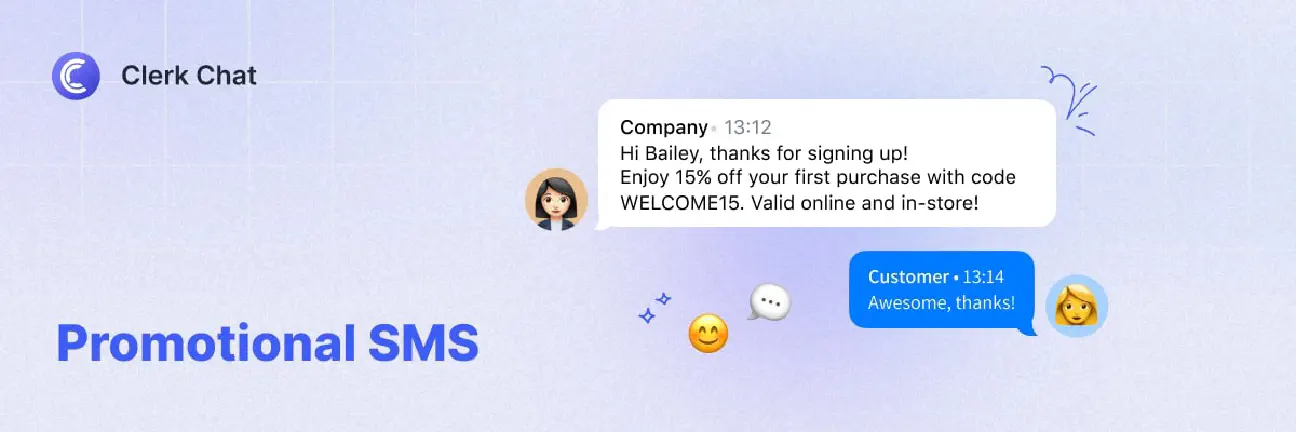
2. Transactional SMS Marketing Campaigns
Transactional SMS marketing messages don’t focus on directly encouraging a sale, but they can help to improve customer experiences, increase loyalty, and boost a customer’s lifetime value. Transactional text messages deliver time-sensitive information to customers.
For instance, they might let them know when a company has received an order placed on their website, or when that order has been shipped. Transactional messages can also help customers complete tasks, like resetting a password to regain access to an account.
Companies using SMS for finance, and service marketing, can also use transactional messages to send appointment reminders to customers or notify them about upcoming deadlines.
3. Conversational and Customer Service SMS Marketing
Conversational and customer-service focused SMS marketing campaigns are a form of two-way SMS marketing. They involve allowing customers to communicate with a company’s customer service team directly, or with a conversational AI solution, to complete tasks.
You can use customer service messaging strategies to rapidly respond to customer queries about products, and nurture them through the sales cycle.
For instance, your messaging campaign might start by introducing a customer to several new products in your collection, then ask them to respond with any items they’re interested in. Once you get a response, you can use your conversational messaging service to answer any questions customers might have, and encourage them to purchase a product.
4. Drip Campaigns
Drip SMS campaigns are similar to drip campaigns in the world of email marketing. They involve creating a series of messages that are automatically delivered to customers at specific time via text messaging automation technologies.
A common example is the welcome drip campaign, which initially introduces customers to your company, products, and services, then shares insights into your top-selling products over a specific period of time. Drip campaigns can share more than just promotional information.
They can also include insights into your business, provide advice on how to access customer service, or demonstrate thought leadership, boosting your ability to earn the trust of your target audience.
5. Survey and Feedback Texts
SMS marketing can also offer companies an excellent way to gather feedback and insights from customers. Using a texting service, companies can send bulk SMS messages to customers that have completed a purchase or a customer service interaction, and ask them for feedback.
Since SMS gives customers an easy way to share insights, by rating an experience on a scale of one to ten, or simply responding to a question with a yes or no answer, it can provide businesses with rapid insights into customer perceptions and preferences.
If you can encourage customers to share lengthier reviews of products and services with your team, you can also use these messages as social proof on your website, social media pages, and more.
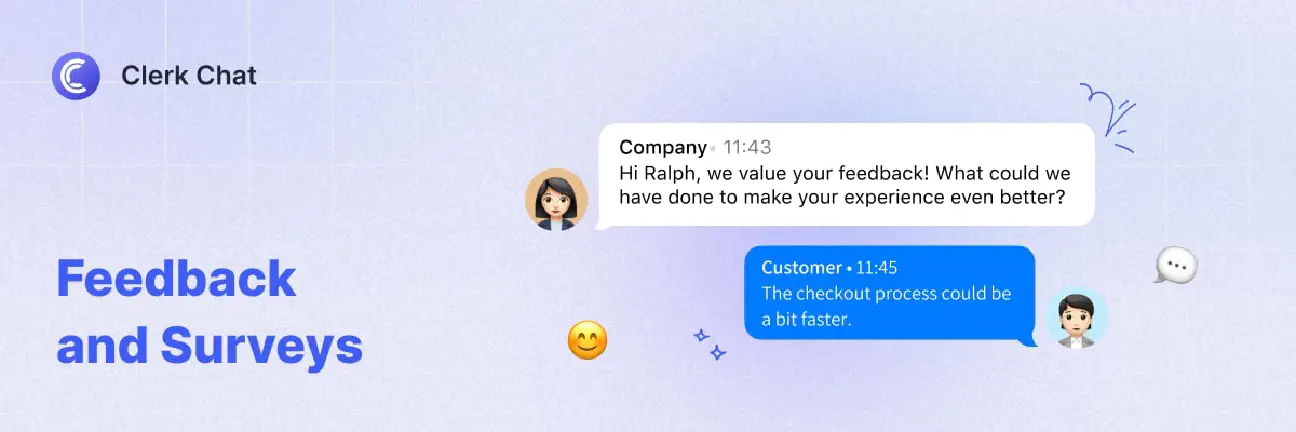
SMS Marketing Best Practices for Business Leaders
Sending SMS marketing messages to customers is an incredible way to boost brand awareness, increase engagement, and unlock higher conversion rates. Virtually every company can benefit from the right SMS marketing strategy. However, there are some challenges to overcome.
To ensure you’re delivering the best experiences to customers, earning their loyalty, and avoiding compliance issues, you need to follow the following SMS marketing best practices.
1. Understand and Comply with Texting Laws
First, ensuring you’re investing in comprehensive SMS marketing compliance strategies is crucial. There are various mandates and regulations that govern how and when companies can send promotional messages to customers.
For instance, if you want to comply with TCPA guidelines and 10DLC registration requirements, you’ll need to ensure you’re using the right numbers and tools to send messages to customers. There are also guidelines to consider for CAN-SPAM act text messages. For instance, you’ll need to ensure you’re not sending misleading messages and that you identify yourself clearly to recipients.
On top of these guidelines, each industry has its own specific laws and mandates to consider, from HIPAA texting in the healthcare sector to SEC texting in finance.
Some of the most significant practices you should consider include:
- Opt-in and opt-out rules: Most regulatory guidelines surrounding SMS marketing require companies to obtain explicit consent to communicate with their customers via text. You’ll also need to ensure that your customers have an easy way to opt-out of receiving messages from your business, to adhere to compliance laws.
- Archiving and data retention: If you’re using SMS for healthcare, finance marketing, or retail, you’ll need a solution that allows you to archive and retain critical data. Choosing an SMS marketing platform that integrates with archiving tools will ensure you can keep comprehensive audit records.
- Security and data protection: If you’re going to be collecting any personal data from customers, related to their contact details, their health, or their credit card information, you’ll need to ensure that data is safe and protected. This means leveraging end-to-end encryption methods, and access controls to defend your data.


2. Segment your Audience and Personalize Campaigns
71% of customers now expect companies to personalize every interaction with them. Segmenting your audience based on their previous purchasing histories, demographics, and other data will ensure you can send more valuable, and engaging messages to your customers.
With the right SMS marketing platform, you should be able to split your SMS contacts into different groups, and ensure you’re not sending irrelevant notifications to your customers. This will improve customer experiences, enhance your conversion rates, and increase customer loyalty.
Personalizing messages with specific references to relevant products or your customer’s name, will also help you to build deeper, more emotional connections with your audience.
Remember, personalization in text messaging marketing also means making sure you send your SMS messages at the right times. Based on what you know about your audience’s location, you should be able to figure out how to schedule SMS campaigns to arrive when customers are most likely to see them. In other words, you won’t be sending messages when your customers are asleep or at work.
Once again, this will improve your customer’s experience, and it will help you to adhere to compliance rules and guidelines that prevent companies from sending messages at inappropriate times (such as during the early hours of the morning).


3. Leverage Automation Effectively
Implementing automation into your SMS marketing strategy is one of the best ways to ensure you can boost the ROI and results of your campaigns. Innovative conversational and application to person texting platforms, like Clerk Chat, will allow you to create and send automated campaigns with ease.
They’ll allow you to design campaigns specifically tuned to the needs of specific segments in your target audience and schedule messages to arrive at the best time for each customer. They’ll also ensure you can include the right information in your SMS templates to reduce compliance risks.
For instance, you can ensure every message includes opt-out instructions, to adhere to TCPA, CAN-SPAM, and A2P 10DLC rules.
Automation will also help you to more effectively gather data from your messaging campaigns. Some text message marketing solutions can even integrate with your CRM systems and other technologies, to automatically enhance your customer profiles and help you make intelligent business decisions.
There are even tools that can help you eliminate repetitive tasks, like solving common customer queries with AI SMS systems that offer 24/7 support to your consumers.
4. Craft Compelling, Powerful Messages and Campaigns
There’s no one-size-fits-all guide to crafting the perfect messages for your SMS campaigns. The right messaging strategy will depend on a number of factors, including your target audience, the types of messaging strategies you’re using, and your business goals.
However, when you’re crafting engaging SMS templates for your marketing strategy, there are a few key things you should always keep in mind:
- Keep it short and sweet: Most mass messaging tools will limit the length of your text messages automatically. If your notifications are too long, you’ll end up sending multiple texts to customers at once, which can be overwhelming. Keep your messages short and sweet, and shorten links wherever possible with short codes.
- Use keywords: Although keywords are often associated with search engine optimization, they can be useful in your SMS marketing strategy too. SMS keywords will automatically capture the attention of customers, drawing attention to products and services they might be interested in. They’ll also help these customers search for more information online.
- Include a CTA: Include a powerful call to action (CTA) in every SMS message to let your customers know what they should do next. Simple CTAs like “subscribe here”, or “click here” with an included link will drive customers to the next stage in their purchasing journey.
- Showcase your brand personality: Don’t be afraid to let your brand’s personality shine through in your text messaging campaigns. The use of playful, informal language, emojis, and specific statements can strengthen emotional connections between your brand and customers, increasing your chances of future conversions.
Remember to include any necessary information required for compliance purposes too, such as your company’s name, and opt-in and opt-out guidelines.
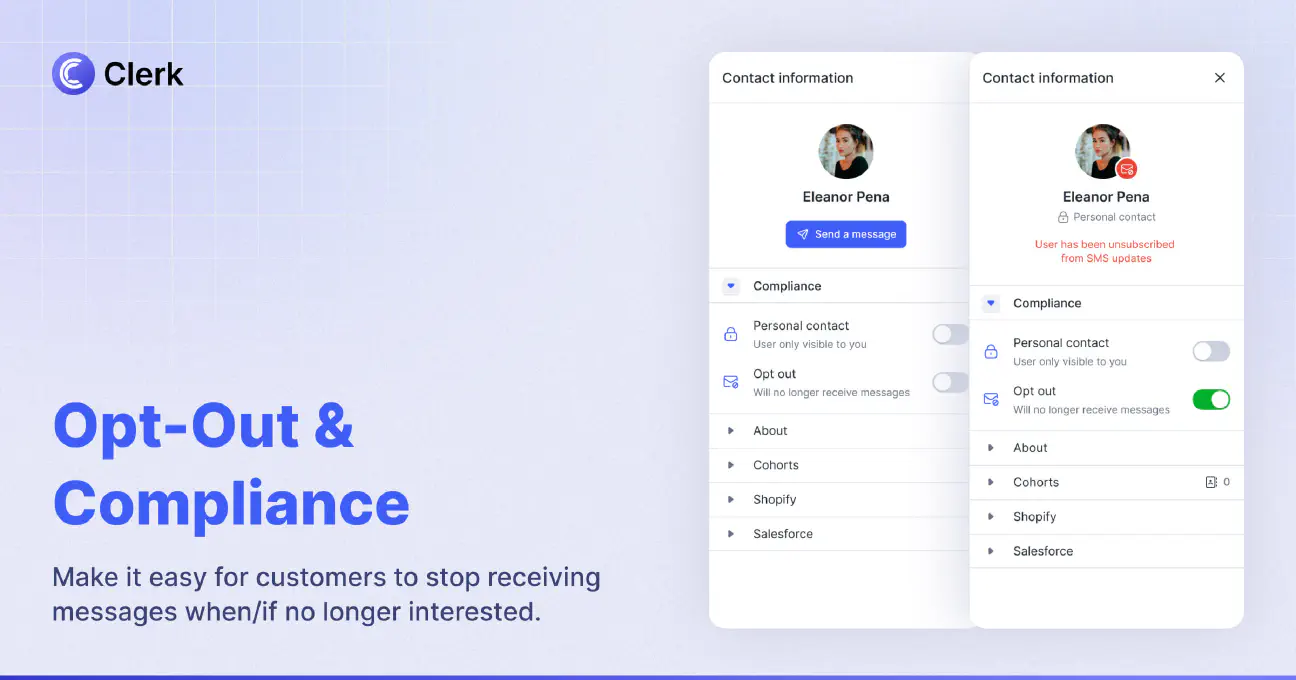
5. Track, Analyze, and Optimize Performance
As with any marketing strategy, the key to optimizing the ROI of your text message marketing strategy is data. You should be constantly gathering insights from every campaign you produce, to determine how you should progress with your future messaging methods.
The more data you can gather, the more effectively you’ll be able to use your marketing budget. Combine insights into engagement and open rates, unsubscribe and subscriber rates, and customer satisfaction scores with insights from text surveys.
Use A/B testing strategies to experiment with different sending times and frequencies for your SMS campaigns and identify which methods have the best impact on conversion rates.
Combine the information you gain from your SMS marketing analytics with insights from other omnichannel marketing campaigns, for a better idea of how you should use SMS to engage, nurture, and convert your target audience.
How to Get Started with SMS Marketing Strategies
While it takes time to master SMS marketing, getting started is often simpler than it seems. There are plenty of tools and resources that can help you leverage everything from Microsoft Teams texting strategies, to conversational campaigns, and more.
Here’s a quick guide to the steps involved in launching your text message marketing campaigns.
Step 1: Build your Subscriber List
The first step in developing a strong SMS marketing campaign is building your contact list. As mentioned above, most regulatory bodies require companies to obtain direct consent from customers to contact them with marketing messages.
For companies in highly regulated industries, such as those using healthcare, finance, and insurance SMS campaigns, double opt-in strategies are usually a good way to preserve compliance and foster trust. These strategies involve asking customers to confirm they want to receive messages from you a second time, after they give you their contact details.
When you’re building your subscriber list, you’ll need:
- A way to collect subscriber details: A landing page, pop-up on your website, or contact form will give you an easy way to quickly collect phone numbers, names, and other contact details from your customers. You can also consider using a “text to join” campaign.
- A lead magnet: Your lead magnet is the incentive that convinces customers to share their contact details with you. You might offer something like a discount on a customer’s first purchase, access to a free download, or another exclusive benefit.
- Tools for managing contact details: Once you have collected customer contact details, you’ll need to ensure you can organize them and segment customers into different groups. A CRM solution integrated with your SMS marketing tool can help with this.
Step 2: Choose the Right SMS Marketing Platform
Once you have your contact list, you’ll need your SMS marketing platform. This is the software that will allow you to build, manage, and automate your promotional campaigns. In a moment, we’ll discuss some of the top text messaging marketing platforms available. In the meantime, however, these are the things you should focus on when making your choice:
- Security and compliance: The right marketing platform should make it easy to track compliance data and adhere to regulations and industry-focused requirements. Look for a solution that offers end-to-end encryption, access controls (such as two factor authentication), and integrations with SMS archiving systems. You should also be able to easily track opt-in and opt-out requests, and choose the right phone number for your campaigns.
- An easy to use editor: Your platform should include the tools you need to create powerful marketing campaigns, such as SMS templates you can adapt to match your brand. It should also offer access to personalization options, which allow you to create specific campaigns for different customer segments and groups.
- Crucial text capabilities: A comprehensive SMS marketing platform will offer access to a range of features, such as mobile keywords and shortcodes to trigger automated actions and customizable automated workflows for drip campaigns. Some solutions will also enable you to manage and segment contacts in a single, unified platform.
- Integrations: Integrations are crucial for a strong SMS promotional campaign. Your solution should work alongside your existing marketing tools and platforms, as well as customer relationship management tools, help desks, and databases. Look for a platform with a wide range of SMS integrations to choose from.
- Reporting and analytics: Ensure your SMS marketing solution makes it easy to track the impact of your campaigns, with insights into open-rates, subscribe and unsubscribe rates, click-through rates, deliverability rates, and more.
Step 3: Design and Launch your Campaigns
Now you have your SMS marketing solution, you’re ready to design and implement your campaigns. As mentioned above, it’s important to ensure your campaigns are short, straight to the point, compliant with industry regulations, and representative of your brand.
However, they should also offer immediate value to your target audience. Whether you’re using promotional, transactional, or conversational SMS marketing, your campaigns should always delight your target audience. When building your campaigns:
- Avoid spam filters: Avoid using spam terms and uncommon text abbreviations that could harm your deliverability rate. You can use emojis and informal language, but try to maintain a professional tone to earn the trust of your audience.
- Experiment: Experiment with different types of campaigns, from drip campaigns that welcome customers to a relationship with customers, to long-term promotional campaigns that highlight specific products and services.
- Personalize each campaign: Remember to use audience segmentation to ensure you’re sending the most relevant and engaging messages to each customer. Personalize messages with specific product references, and by using your customer’s name in the text.
- Test delivery times and frequencies: Around 81% of customers unsubscribe from contact lists because they think brands send them too many messages. Experiment with the timing and frequency of your messages to optimize your results.
- Track the right metrics: Pay close attention to crucial SMS marketing metrics, such as open rates, click-through rates, conversion rates, customer engagement, and ROI. Gather feedback from customers regularly to inform your future campaigns.
Text Message Advertising Examples
Now we’ve shared some of our top SMS marketing tips, best practices, and steps for success, you might be wondering how companies in different industries can use SMS marketing to their advantage. Here are some great examples to learn from.
Retail: Flash Sales and Promotions
In the retail industry, SMS marketing is perfect for promoting discounts, offers, new products, and flash sales. You can use your automated messaging system to send customers immediate information about your latest offers, along with links that encourage quick conversions.
For the best results, remember to segment your customers, so you can send each group within your target audience messages relevant to their interests and goals.
Real Estate: Appointment Reminders
In real estate, you can use SMS to welcome and nurture new leads, confirm appointments for viewings, and remind customers about upcoming events. SMS is a great way to share information on new area listings, promote open houses, and even alert clients to price and status changes.
You can even include links in your SMS messages that give customers directions to the house they’re going to be viewing.
Nonprofits: Donation Campaigns
SMS marketing isn’t just for traditional non-profit companies. Various organizations use SMS for churches, and other nonprofits to help keep communities informed and engaged. You can use SMS strategies to provide insights into fundraising events, send thank you messages to people who donate, or even remind subscribers of donation deadlines.
You can also use SMS to alert community members to other messages you’ve sent via email or social media, asking them about volunteering times, or their work on fundraising events.
Services: Appointment Confirmations
SMS marketing is an incredible resource for the service industry. It’s the perfect way to confirm appointments with customers, as well as cancellations, and remind people about upcoming events. You can even use text messages to let customers know about last-minute openings, promotions, or service discounts, increasing conversion rates.
If customers subscribe to regular services, you could use SMS to let them know when they should be thinking about booking their next appointment too.
B2B: Lead Nurturing
In the B2B industry, SMS can be an excellent way to nurture and engage leads. You can use texts to send people invitations to upcoming events and demonstrations, set appointments with stakeholders, or even provide them with useful information and guidance.
SMS can also be a fantastic way to share access to new webinars and downloadable content, or highlight company announcements and service updates.
5 Impressive SMS Marketing Platforms to Consider
As mentioned above, one of the most important tools you’ll need to invest in SMS marketing, is the right automation platform. There are plenty of valuable options out there, but some do offer more features and versatility than others. Here are 5 top platforms to consider.
1. Clerk Chat
Clerk Chat is the number one SMS marketing platform, serving small businesses and enterprises alike. Not only does this platform make it easy to create powerful SMS campaigns, but it also ensures companies can invest in a range of different strategies, from two-way messaging, to transactional texting, conversational SMS, and promotional campaigns.
With Clerk Chat, you get an all-in-one solution for building messaging templates and automated workflows, as well as end-to-end reporting and analytics features, cutting-edge AI technologies, and enterprise-grade security. Clerk Chat even makes it easy to integrate your text marketing strategy with other tools, from collaboration apps for Zoom texting strategies to CRM databases.
Plus, it’s designed to ensure comprehensive compliance with everything from TCPA and 10DLC standards to industry-specific regulations.
2. SlickText
For companies in search of a simple and straightforward SMS marketing solution, solutions like SlickText can be extremely useful. This SMS advertising software can integrate with your existing software using a flexible, global API platform. Plus, it comes with various valuable features for two-way text messaging, scheduling, and analytics.
SlickText also gives companies access to tools they can use to build their SMS contact list, such as “text to win” and “text to join” solutions. With this platform, companies can set up everything from SMS autoresponders, to mass marketing campaigns in seconds. There’s even a free plan available, making SlickText particularly appealing for SMS marketing for small business owners.
3. SimpleTexting
Another straightforward SMS marketing services and texting platform, SimpleTexting is similar to SlickText in a lot of ways. It allows companies to create automated welcome messages, out-of-office texts, and behavior-based text campaigns with ease.
This platform also includes built-in workflow creation features, tools for team collaboration, and APIs to enable integrations with your existing business software. Although the solution doesn’t include advanced AI capabilities, it does allow for unlimited contact management, and supports text keywords, short-codes, and two-factor authentication for security.
4. Textedly
Designed to make text message marketing easy, Textedly allows companies to instantly send huge volumes of text messages to customers in an instant. You can build opt-in subscriber lists with the platform, segment your subscribers into different groups, and schedule messages to arrive at the perfect time for your consumers.
Textedly also enables some other useful text-based features for companies, such as the option to allow customers to pay bills through SMS. Plus, there’s a handy feature for collecting reviews from customers with survey and feedback requests. The solution also complies with various SMS marketing standards, and supports 10DLC registration.
5. Brevo
Brevo, formerly known as Sendinblue, is an all-in-one platform for email and SMS marketing automation. Like many of the top solutions for text-based advertising, Brevo allows users to collect leads with opt-in forms and landing pages, and segment their audience into different groups.
The platform comes with built-in analytics, so you can track the performance of every marketing campaign, as well as robust end-to-end security features. Plus, it makes it easy for teams to work collaboratively on omnichannel advertising strategies. Although Brevo does offer a free plan, the number of texts you can send on this plan is extremely limited. You will need to buy SMS credits separately for your marketing campaigns.
Unlock New Growth with SMS Marketing
Ultimately, SMS marketing offers companies a phenomenal way to increase brand awareness, boost audience engagement, and turbocharge conversion rates. As customers continue to spend more time interacting with companies, searching for products, and making purchases on their smartphones, the potential of text messaging marketing will only continue to grow.
With Clerk Chat, launching your own SMS marketing campaign couldn’t be easier. With tools that enable every form of SMS marketing, integrations for your existing business applications, and powerful AI and automation tools, Clerk Chat ensures any business can discover the power of SMS.
Contact Clerk Chat today to learn more about the incredible features of our platform or request a demo of our world-leading text marketing software.
In this article:
- What is SMS Marketing? An Introduction
- The Benefits of SMS Marketing for Business Growth
- The Common Types of SMS Marketing Messages
- SMS Marketing Best Practices for Business Leaders
- How to Get Started with SMS Marketing Strategies
- Text Message Advertising Examples
- 5 Impressive SMS Marketing Platforms to Consider
- Unlock New Growth with SMS Marketing
Ready to use your business number for text messaging?
Thousands of businesses are already experiencing the power of conversational messaging through SMS. Join us. Free trial and paid tiers available.
Get Started#Subscribe
Get product updates in your inbox
Tutorials, features, and Clerk Chat news delivered straight to you.
